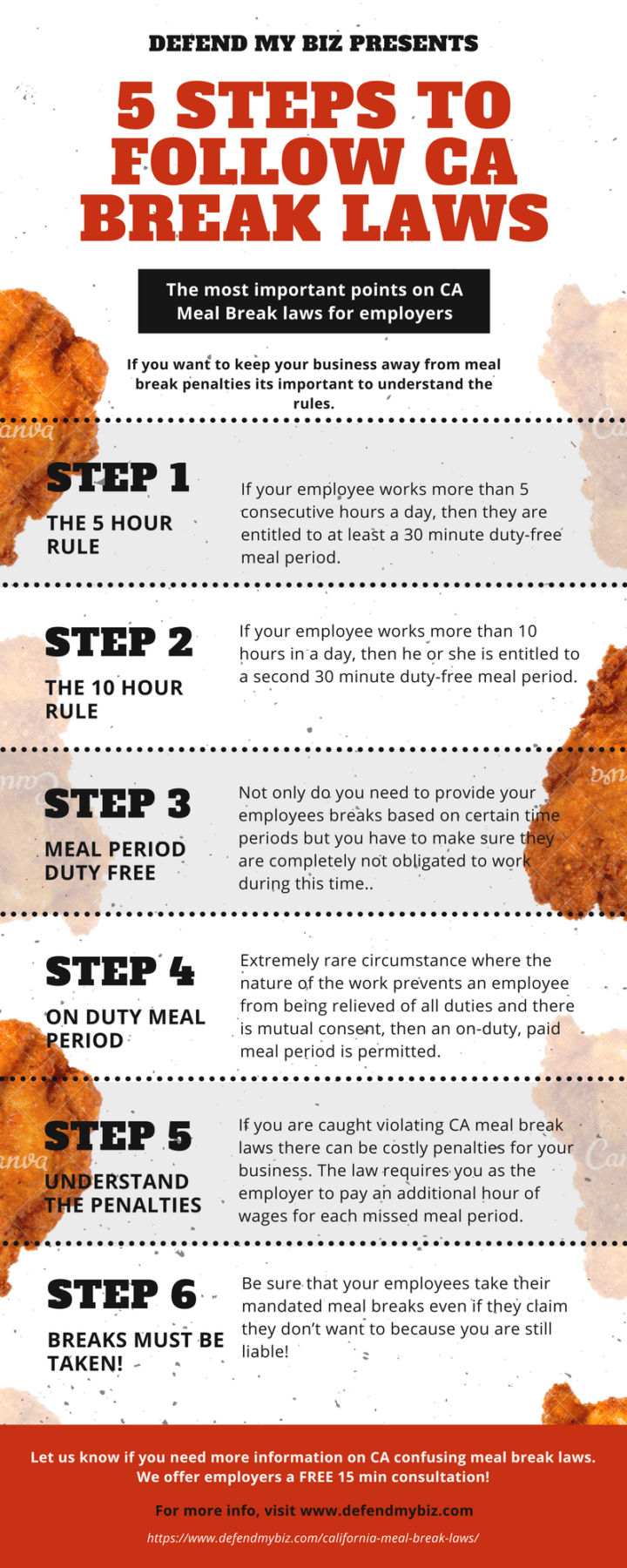
Posted on July 9th, 2015
Want to download this helpful article as a FREE PDF?
If you want to keep your business out of labor litigation its really important you understand California’s meal and rest break requirements.
One really common issue facing employers is struggling to comply with California laws regarding meal periods.
This can be difficult for you as the employer because;
- Maybe you are not aware of all the details of the law
- The laws keep changing and its hard to keep up
- The role of your employee is not traditional and does not fit well with mid shift breaks
- Your employees are not good about always remembering to take their breaks
However, no matter what the reason for it, if you fail to comply with these laws it can really leave you vulnerable and potentially turn into a very expensive problem.
So this blog post aims to make it easier to understand the current Meal break laws in California (2016 as of this writing).
Here is an infograph I put together for you with a more detailed article below that.
Infograph: Following California Meal Break Laws
Want to share this image on your site? Just copy and paste the embed code below:
Overview California Meal Break Laws

5 Hours
Whenever your employee works more than 5 consecutive hours a day, then they are entitled to at least a 30 minute duty-free meal period.
The first meal period they take must be before the end of your employees fifth hour of work.
The only exception to this rule is if an employee’s work period lasts less than six hours, then this meal period can be waived if you and your employee come to a mutual agreement.
10 Hours
If your employee works more than 10 hours in a day, then he or she is entitled to a second 30 minute duty-free meal period.
If however the employee’s workday lasts less than 12 hours, then this meal period can be waived if you and your employee come to a mutual agreement.
The law requires that you provide your employees with meal breaks and to relieve your employee of all activities and working responsibilities during his break.
The employer must relinquish control over the worker’s duties during his meal break.
Employees should receive a reasonable opportunity to take their meal breaks for uninterrupted 30 minutes , and you the employer should not discourage any of your employees from taking their meal break.
Off Duty or Duty Free Meal Period
So what exactly is meant by ‘Off Duty’ or ‘Duty Free’ Meal Period?
So you saw I mentioned ‘Duty Free’ a few times. Its important to know what this means because this is where some California employers get into trouble.
Not only do you need to provide your employees breaks based on certain time periods but you have to make sure they are completely not obligated to be working during this time.
For example, if it was a receptionist employee you cant say ‘well go ahead and eat your lunch but stay at your desk so you can still answer the phone if it rings’.
If they are taking their mandated meal break they need to be totally ‘off duty’ or ‘duty free’ meaning not required to do any work during this time. In other words this break is their time not company time so they should be free to leave the area if they want.
Pay And Meal Breaks
You as the employer are not required to pay for your employees meal period or mandated break so long as it remains duty-free. A meal period will not be considered duty-free if the employee is required to remain at the workplace or required to perform any work related duties during the meal period.
If you had an employee that you need to do ‘on duty’ breaks you have to pay them and it must meet some other requirements we get into below.
On Duty Meal Period
Lets take a look at the rare exception to the off duty rule and that is what is called the ‘on duty meal period’.
Even though on duty situations are really rare we wanted to explain it because its important to understand it. Incorrectly using it could be costly.
In instances where the nature of the work prevents an employee from being relieved of all duties and there is mutual consent between the employer and the employee, then an on-duty, paid meal period is permitted.
Sounds good right? BUT…The first thing you need to realize as an employer is that on-duty meal periods are not permitted in almost any situation. You should totally avoid it altogether as much as possible to avoid problems.
Here are the very narrow circumstances on duty meal periods are legal.
-The type of work being done prevents your employee from being relieved of all duty.
-You and your employee agree to on-duty meal periods in writing.
-The employee is still being paid during the meal period.
-The agreement to waive the meal period can be revoked at any time in writing by the employee.
While this does not sound like that difficult of requirements to meet to use the option the ‘type of work that prevents them from taking their meal period’ is extremely debatable. While you might feel like it was your only option, labor lawyers are going to have a field day picking it apart.
That is why again I recommend you avoid this ‘on-duty meal period’ as much as possible.
Meal Break Penalties
If you are found to be in violation of California meal break laws it can be some stiff and costly penalties for your business.
If you fail to provide a meal period the law requires you as the employer to pay your employee an additional hour of wages for each missed meal period.
So think about that for a minute. If your employee went without the break every day for a few years you owe them an hours pay for every single day they missed it.
Since this additional pay is considered wages, the statute of limitations for filing a claim arising from missed meal periods is 3 years.
If you have an employee who worked for you 4 years ago than the statue of limitations has passed and you would be off the hook for that particular situation.
You should consult with an experienced employment law attorney today to ensure that your company is in compliance with the California Attorney for Labor.
Conclusion
This information is vital to you as the employer because meal and rest breaks continue to be the cause of many legal issues for employers. Understanding the laws involved in this matter can help your company avoid lawsuits.
Communication is also important, let your employees know the legal requirements and that they are being provided with their breaks according to the law.
Be sure that your employees take their mandated meal breaks even if they claim they don’t want to.
Also be sure that your professional Policies and Procedures package is in place that cover all the meal break and rest period requirements for your business.
Want to download this helpful article as a FREE PDF?

Book a FREE 15 Minute Consultation with me today so I can listen to your story and tell you exactly what you need to do to get rid of your employee problems.
Download My Free Ebook: ‘6 Tips To Protect Your California Business From an Employee Lawsuit’

